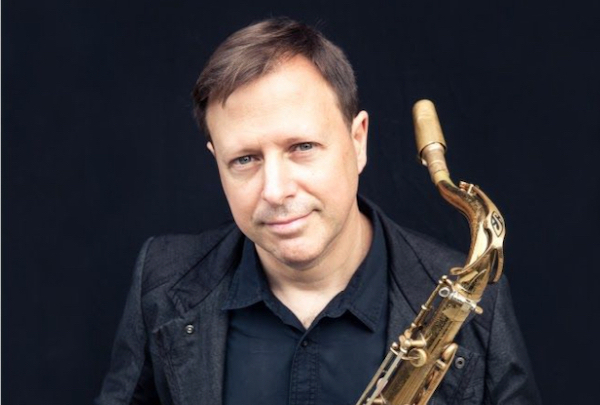Jan 13, 2026 2:09 PM
More Trump-Kennedy Center Cancellations
The fallout from the renaming of the John F. Kennedy Center for the Performing Arts to include President Donald…

While recording There Is A Tide, Chris Potter was able to focus on thinking like a producer.
(Photo: Bill Douthart)You open the album with “I Had A Dream,” which seems connected to the Dr. Martin Luther King Jr. speech. Is the title linked to the following cut, “Like A Memory”?
The way that it worked out, I kind of saw all the titles as a poem, really. And it was interesting that the order of the [songs on the] album is the order that I wrote the tunes in.
I’ve never done that; it’s never worked out that way. But I think because I did it all in such a concentrated period of time, there was a narrative thread even through the writing. I came up with these bass lines one evening, then I wrote two tunes a day for five days, fleshed it out and then started to record. It evolved from there.
So, yes, the name of that obviously has a political meaning. Maybe, it also sort of has a personal meaning, in terms of what the poem of the titles are. I don’t even really know how to describe what the meaning is.
You’ve worked with Manfred Eicher on your ECM releases, and there’s a lot of discourse in jazz around the idea of collective interaction. Was it weird to not have a check on yourself for Tide?
[Eicher] definitely has ways of adding his input in; I didn’t even think of that. The real difference is not because of a producer, but because of other musicians that you’re working with. And the feeling that you get when you’re playing. You can usually feel if it was a good take or a bad take or what’s going on or what’s needed. You can feel how that bounces off the people in the band—that’s really the primary thing that I’ve always noticed.
It’s funny. It’s really hard to explain, but you can tell if things are working or not by the energy that comes from other people. So, if you don’t have that, you’re gonna end up chasing your tail. I think I was able to avoid that to a certain extent. But the way that I did it was just by many, many, many hours spent doing it: 12-hour days, three days just on the bass part, trying to get it to groove enough. Certain moments that might pass by that no one would even notice, I might have spent hours on, because I heard that the piano chord has to come in right at this exact moment: Now, that’s too thick. Now, it’s not thick enough.
While making Tide, did you think at all about being connected to the beginning of the music through folks like Red Rodney—or indirectly to Alla Rakha through playing with his son Zakir Hussain in the Crosscurrents Trio—and how players from previous generations would have perceived the project?
That’s maybe one more thing that makes it of its time.
The ability to do this at home, the ability that we have to communicate with one another, even though we can’t [be in a room together], that’s a big thing that’s coloring our experience of this particular pandemic, this particular situation. ... Even as a musician unable to play for audiences, unable to play with people, which is the lifeblood of the kind of music that we make, we’re still able to create something and put it out there. There’s a bit of a time lag—I did this in May, June, and it’ll come out in December. You are going to put it out and people are going to hear it, and it is gonna be “music” in that sense.
A lot of people would say that the period you were recording this was the worst of what we’ve experienced so far in 2020. Was the tumult over social justice and the federal response to the pandemic part of what prompted you to record Tide?
I just kind of did one thing at a time. There was a piece I had written for classical saxophone and piano, and then there’s the music I’ve been working on for a long time, anyway—with big band and vocals. I had kind of finished with those two projects and I said, “Well, let me have some fun and see if I can make a record playing everything.”

Belá Fleck during an interview with Fredrika Whitfield on CNN.
Jan 13, 2026 2:09 PM
The fallout from the renaming of the John F. Kennedy Center for the Performing Arts to include President Donald…

Peplowski first came to prominence in legacy swing bands, including the final iteration of the Benny Goodman Orchestra, before beginning a solo career in the late 1980s.
Feb 3, 2026 12:10 AM
Ken Peplowski, a clarinetist and tenor saxophonist who straddled the worlds of traditional and modern jazz, died Feb. 2…

The success of Oregon’s first album, 1971’s Music Of Another Present Era, allowed Towner to establish a solo career.
Jan 19, 2026 5:02 PM
Ralph Towner, a guitarist and composer who blended multiple genres, including jazz — and throughout them all remained…

Rico’s Anti-Microbial Instrument Swab
Jan 19, 2026 2:48 PM
With this year’s NAMM Show right around the corner, we can look forward to plenty of new and innovative instruments…

Richie Beirach was particularly renowned for his approach to chromatic harmony, which he used to improvise reharmonizations of originals and standards.
Jan 27, 2026 11:19 AM
Richie Beirach, a pianist and composer who channeled a knowledge of modern classical music into his jazz practice,…